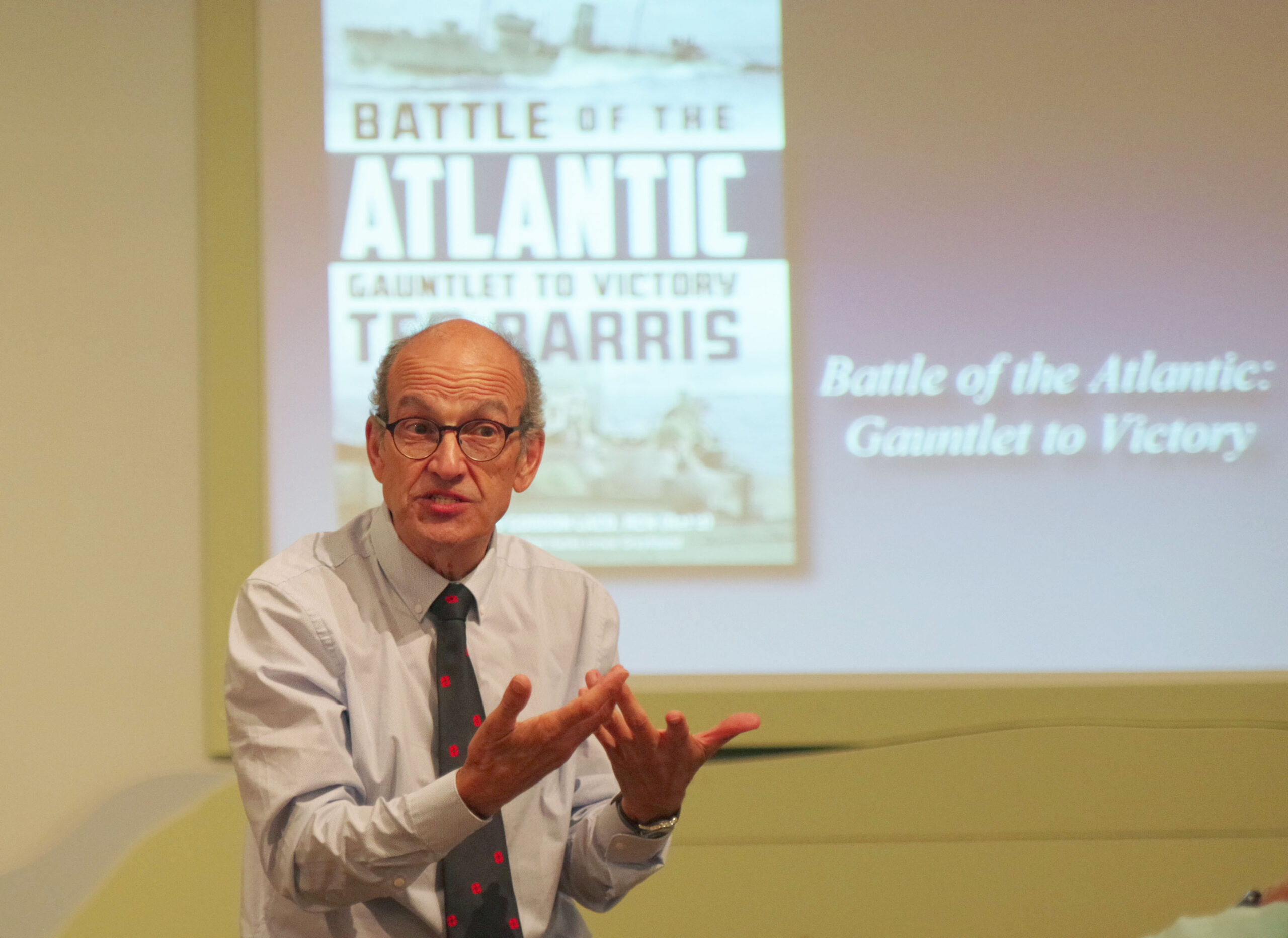Author Ted Barris speaks about latest book at Swift Current presentation
Posted on 26 July 2023 by Matthew Liebenberg
By Matthew Liebenberg
The longest campaign during the Second World War was the focus of an engaging presentation during a special Write Out Loud event at the Swift Current Museum, July 19.
The speaker was acclaimed writer, journalist and broadcaster Ted Barris, who has become well-known for his non-fiction works about Canada’s military heritage.
His latest book Battle of the Atlantic: Gauntlet to Victory was published last fall. It is his 20th non-fiction book, of which 12 are on Canada’s military history.
His presentation gave a perspective on Canada’s longest continuous military engagement of the war by recounting the experiences of those who were part of the Battle of the Atlantic. It gave audience members a glimpse into his extensive research for this book and his focus on retelling the stories of veterans.
He spoke at the start of his presentation about how he views his role as a writer in remembering the sacrifice of veterans.
“One of the things that always bothered me about that aspect of our lives is that when November 11th came along, we always went to the cenotaph and were told to be silent,” he said. “And what we needed more of was not silence. We needed these men and women to speak, to tell us what they’d been through. So my job was to unsilence those memories and the exchange.”
It became a lifetime of effort through his writing to break the silence by talking to veterans, but it also comes with a responsibility to reflect those stories in an accurate way.
“It’s that which delivers this,” he said. “It’s that gift of you’re sitting down with me and allowing me to ask you questions, and you’re honestly and faithfully delivering the stories. That’s how this happened.”
He has been collecting interviews about the Battle of the Atlantic since 1976 and the writing of this book was basically his pandemic project, because he started writing it in 2020. His goal was to highlight the various aspects of this battle.
“For me, it’s about the voices of the people who were there,” he said. “It’s about people whose experiences in whatever fragments and pieces I could find would give you, the reader, a strong sense of what it was like to be in the Navy, the Air Force, the merchant sailors, or even civilians involved in aspects of the Battle of Atlantic.”
This battle lasted for nearly six years from September 1939 to May 1945. Those 2,074 days of ongoing efforts to protect ships against German submarine attacks were crucial to the success of the Allied war effort. The convoys across the Atlantic provided essential supplies to keep the war going and to provide goods to the people of Britain.
Canada had only 13 warships at the start of the war, but by May 1945 it grew to 410 fighting ships. There were 3,000 regular sailors in the Royal Canadian Navy when the war started and at the end of the war there were 100,000. As a result, the Canadian Navy was the fourth largest in the world by the end of the war.
Barris got a sense of what it was like to serve in the merchant navy through the letters of John Birnie Dougall, who was born in Timmons, Ontario. The ship he served on was torpedoed in November 1941 and he did not survive.
The merchant navy was considered to be the fourth arm of the fighting forces during the war, but those sailors did not receive veteran status until 1994. There were 12,000 individuals in the Canadian merchant navy and 1,300 merchant sailors were killed, wounded or captured during the Battle of the Atlantic.
Barris’ presentation included the stories of Canadian women who made contributions during the Battle of the Atlantic. Margaret Los served in the Women’s Royal Canadian Naval Service and she became a radio specialist at HMCS Coverdale.
Barris was able to interview Nan Adair, who grew up in Ontario before the war. She became a member of the group under the leadership of Alan Turing who broke the German Enigma codes.
Barris spoke during his presentation about the crucial role of Canada’s fleet of corvettes that hunted German submarines in the Atlantic as well as the role of anti-submarine aircrews.
The Battle of the Atlantic resulted in the loss of 24 Royal Canadian Navy ship and 2,024 fatalities. The Royal Canadian Air Force lost 752 aircrew members during this campaign.
His book provides a perspective on how the Battle of the Atlantic was experienced by German submariners. He received family permission to use excerpts from the memoirs of Walter Schmietenknop, who was an electrician on a German U-boat. He was the only survivor when Allied forces sunk the submarine in the English Channel. He was sent to Canada as a prisoner of war and later returned as an immigrant.
Barris noted that the stories of the different individuals he spoke about also have an impact on him as a writer and speaker.
“Every time I tell the John Birnie Dougall story, I weep inside, because I know he didn’t make it,” he said. “And yet, every time I tell the Walter Schmietenknop story, I realize here was a man who survived the war and recognized how wonderful Canada was.”
The Write Out Loud series presents readings by Canadian authors to local literary fans in Swift Current. The 2023-24 Write Out Loud series will start on Sept. 24 with a presentation by author, speaker and former broadcaster Zarqa Nawaz. She created the comedy series Little Mosque on the Prairie and she will speak about and read from her latest book Jameela Green Ruins Everything.
Leave a Reply
You must be logged in to post a comment.
